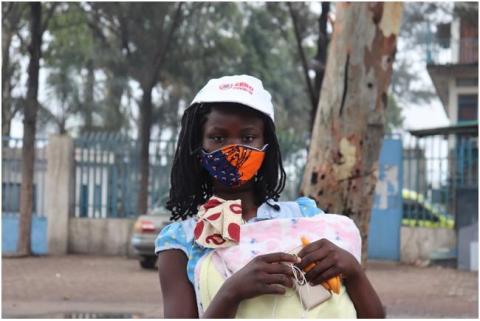COVID 19 Chemicals and Waste in Mozambique

Following the emergence of COVID-19, the President of Mozambique, Hon. Filipe Nyusi, declared a state of emergency on 1st April 2020. He announced a number of measures to contain its spread, including prohibition of public and private gatherings and closure of all external leisure and entertainment establishments, schools, and borders to neighbouring countries, among others. He also put in place financial measures to support the private sector to face the economic impact of the pandemic. The emergency was extended until the end of 2020, when this report was being prepared.
AFSD, in collaboration with VALOR (a local NGO), has been conducting a lot of work to integrate solid waste collection into value chain development and promote safe livelihoods. One can notice the degree of exposure of waste collectors to COVID-19 in the course of their activities, due to lack of information related to preventive measures for COVID-19 imposed by the government and World Health Organization (WHO). Waste collectors are often marginalized and discriminated from the information system. The pandemic also comes with a disproportionate negative effect on gender equality. During the pandemic, women are most affected and frequently find themselves in a disadvantaged economic position. This is because women are more vulnerable, as they have roles to play both at the household and in the field; hence they are more likely to be exposed in different areas. In the household, they are responsible for cleaning and washing, including clothes and homemade masks (reusable), and disposing of wastes that may be contaminated.
There has been an increase of chemicals use and waste generation, particularly plastic waste, in the endeavour to protect people from the COVID-19 pandemic. This includes use of sanitizers and disinfectants, face masks, and gloves, among others. Handling and disposal of these chemicals, waste water from hand washing, and containers of disinfectants and sanitizers has been a big challenge, putting communities and waste collectors at great risk of being infected. The making of sanitizers has been done widely, and, according to the labels, some of the manufacturers are not registered; hence, it is difficult to control their quality and safety standards.
The project involved workplace assessment, sensitization and awareness-raising with waste collectors in Malapane and Hulene; and with farmers’ communities in Mahelane, Mafuiane and Mahubo. Assessment was also done to identify the number of individuals wearing masks at the Municipality dumpsites and at the farms, as follows:
- Identify the types of masks and hand sanitizers used in public places,
- Assess whether masks and hand sanitizers are used correctly, and
- Assess knowledge, attitude and practices on the use of the masks and hand sanitizers.
This report relates to Sustainable Development Goals 3, 6, 8, 10, 11 and 12.
Special thanks to IPEN's Anglophone Africa Regional Coordinator Silvani Mng'anya and IPEN's Anglophone Africa Regional Hub AGENDA for their important contributions to the development and finalization of the project.
| Attachment | Size |
|---|---|
| 3.98 MB | |
| 1.49 MB |
